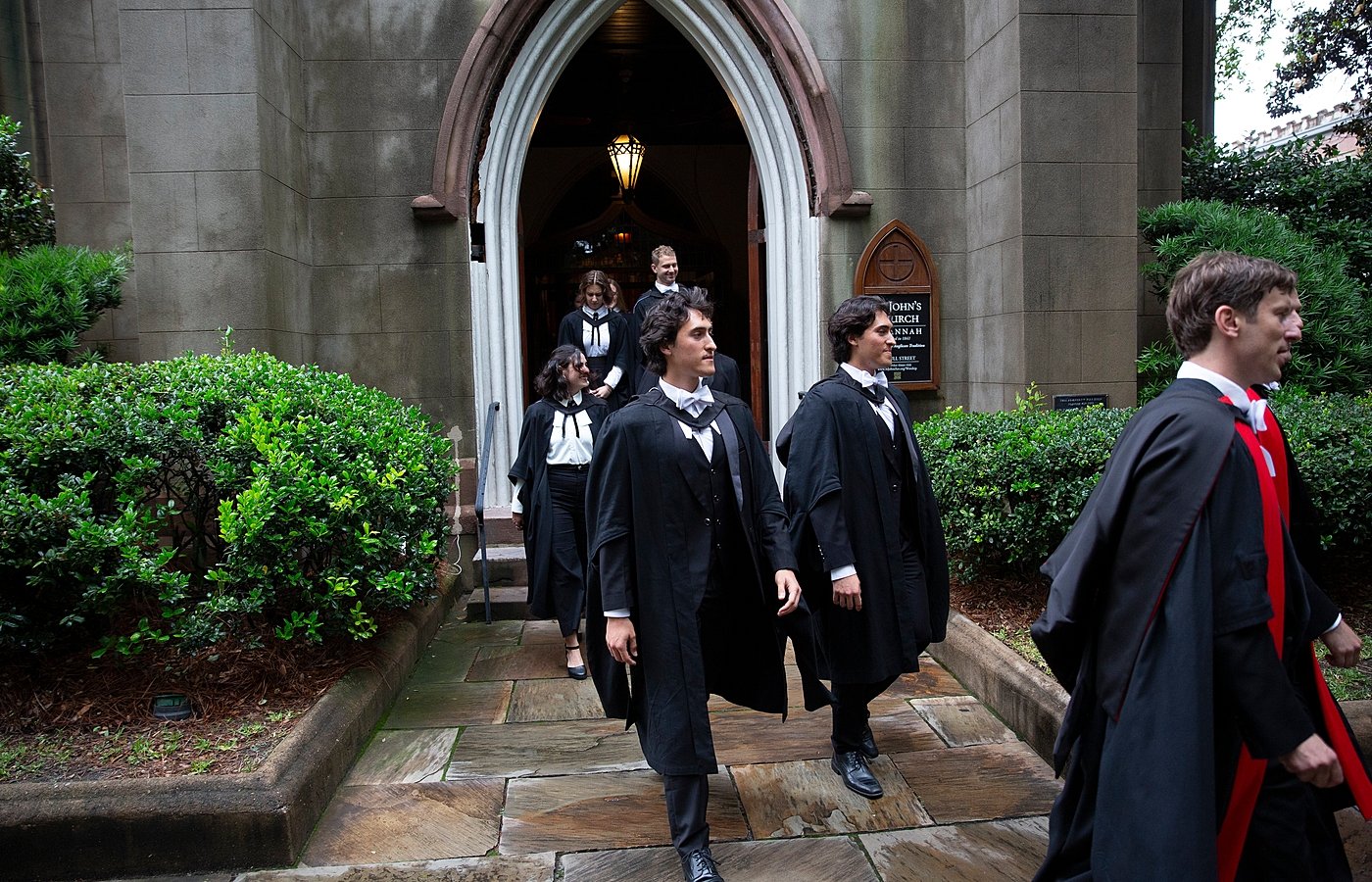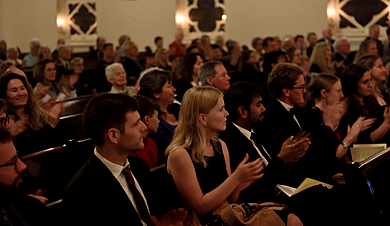

Ralston College graduate accepted to prestigious Wolfram Summer School
News 22nd June 2024 College Staff
Gifted computer scientist Dr Stephen Wolfram joins chorus of tech entrepreneurs and a nobel laureate in belief that navigating the ethical problems around artificial intelligence will rely on those with a background in philosophy
Ralston College MA graduate Rumi Allbert has been selected to attend the prestigious Wolfram Summer School where he will be among the first participants in its new philosophy track.
The two-week program, in which students learn to apply Wolfram’s unique approach to creating ideas and turning them into research, products and companies, will engage Allbert’s skills as an experienced data scientist as well as those he cultivated at Ralston College learning Ancient Greek and studying the greatest works of philosophy in their original language.
Allbert applied to Wolfram Summer School following a virtual Q&A the College hosted with Dr Wolfram in February 2024 in which the gifted computer scientist shared his belief that the successful navigation of the ethical problems posed by artificial intelligence will require individuals seriously committed to robust philosophical inquiry.
Dr Wolfram argued that the humanities are now approaching a new golden age, one where students of philosophy will find themselves with a “once in several hundred-year opportunity.”
He is so persuaded of this that he has added a philosophy track to Wolfram Summer School, and admitted as a student at least one recent humanities graduate.
Dr Wolfram’s back-and-forth with the College’s 22 students, who in May 2024 became its second graduating class, is now available as a Ralston College podcast, Unlocking Consciousness with Dr. Stephen Wolfram: AI & Philosophy.
The value of the humanities in an AI economy
Dr Wolfram joins a growing crowd of industry leaders, including Peter Thiel, IBM AI chief Matt Candy and Nobel Prize-winning labor market economist Christopher Pissarides in proposing that, in an AI economy, the abilities acquired through a humanities degree are as valuable as those developed through a STEM education.
In his Q&A with students, Dr Wolfram noted that AI companies are well-served by employees who have experience with philosophical debate.
“…I could relate horrifying discussions that I've had with people who run the various kinds of companies that are putting AI into the world,” Dr Wolfram said.
“The attempted Socratic discussion about how you think about these kinds of issues, you would be shocked at the extent to which people are not thinking clearly about these issues.
“Now, I don't know how to resolve these issues. That's the challenge, but it's a place where these kinds of philosophical questions, I think, are of very current importance.”
Ralston College students were buoyed by Dr Wolfram’s optimism about the value of the degree that they were in the midst of completing: a one-year Master of Arts in the Humanities that included an eight-week language residency in Samos, Greece, followed by three consecutive terms in Savannah, Georgia.
“In terms of education, the value of a deeply specific, skills-based education, I think, is going to go down. I think the liberal arts story will rise in the next few years,” Dr Wolfram said.
His perspective raises important questions about what type of education universities ought to be offering students in 2024.
President Stephen Blackwood founded Ralston College in the belief that the modern moment demands that institutions of higher education be revived and reinvented.
“What Ralston College is offering has never been more relevant and necessary. It is heartening to see that within weeks of graduating from Ralston College, Rumi Allbert’s education in the humanities will act as a complement to the groundbreaking research on artificial intelligence taking place at Wolfram Summer School,” President Blackwood said.
Wolfram: ‘How do we want AI to run the world?’
Employing philosophy students gives AI companies access to people who are trained to consider the vital governance and ethics questions facing the industry, Dr Wolfram says.
“I would say that an example of a place that is a terrible vacuum in the world today, that there is about to be a collision of the techiest of technology with the most philosophical of philosophy, so to speak, is the whole question of AI governance and AI ethics.
“And this question of if the AI will run the world, how do we want them to do that? How do we think about that process? What's the kind of modernization of political philosophy in the time of AI…? This kind of goes right back to foundational questions that Plato talked about.
“... These are things that if Plato had had an AI, Plato would probably have been thinking about.”
Allbert was among the students to pose a question to Dr Wolfram, wondering how the world might engage in better conversations about AI ethics and AI application.
Dr Wolfram shared his experience working with individuals with a STEM background versus those with a background in philosophy, pointing out that the latter group tended to be able to think more conceptually:
“The idea that there is a general problem to solve that involves general thinking isn't really there. I noticed one thing, a sort of interesting phenomenon. I talk about a bunch of science things with lots of kinds of people, and I'll talk about them with very technical scientists, I can yatter away with all kinds of fancy jargon and so on, which allows me to jump a little bit in what I'm explaining,” Dr Wolfram said.
“But, then I'll talk to people who have more of a philosophy background, here's what I've noticed, this funny phenomenon: The scientists have an easy time with the technical stuff, but when it comes to conceptual change or conceptual leaps, they just don't get it at all. They're just not used to that. They're not used to the idea that there could be very different ways to think about things.
“That is much more familiar in the philosophical tradition than it is in the scientific tradition. The scientific tradition tends to be, you're on this track, and you're going further and further and further down the track. But, the idea that there could be a completely different track is not one that tends to enter. And I think that's a sort of meta thing from at least the philosophical end of the humanities that I think is important.”
About Ralston College
In May 2024, Ralston College admitted its second-ever class of graduates to their Master’s degrees.
The College is a first-of-its kind liberal arts university in Savannah, Georgia, offering a rigorous program for graduate students interested in studying Western civilization, from the Greek world of Homer, to that of Ancient Rome and Medieval Europe and continuing into the Renaissance and our modern era.
Those interested in a curriculum that unites the most profound and provocative works of literature, philosophy and art can request an application for the 2025-26 academic year here.
The College intends to launch an undergraduate program as soon as possible, and in Summer 2024 will debut its first non-degree Summer Latin Program in Italy.
The College has been authorized for operation and awarded degree-granting powers by the State of Georgia.
It is also seeking accreditation from the New England Commission of Higher Education, and was authorized on November 16th, 2023 to publish the following statement:
“The New England Commission of Higher Education has determined that Ralston College is eligible to proceed with an application for candidacy for accreditation within two years. A determination of eligibility is not candidacy or accreditation, nor does it indicate a likelihood of eventual accreditation. Questions about eligibility and the accreditation process should bedirected to the President of the Commission.”
Ralston College is devoted to freedom of thought and speech, has no political or religious affiliations, and does not accept government funds. In addition to its degree program, the College also hosts free, public lecture series, which since 2022 has welcomed more than 1,500 guests.
To date, Ralston College’s podcasts and onlinelectures –also available for free– have reached millions. Founded in 2010, Ralston College is a private, 501(c)(3) institution of higher education.
SUPPORT A NEW BEGINNING
Education and conversation free from censorship, cynicism, and corruption matter. Ralston College is a place for them to happen, for human flourishing and building anew.



